#pluralism
Explore tagged Tumblr posts
Text
Update on the discord server:
Everything is in order, and the server is ready to go! Unfortunately, I'm very busy for the next few days, so we won't be online much to handle moderation/verifying new users- the server will be opened Saturday-Sunday this week for that reason. I'll briefly go over the contents of the server below the cut for those who are interested.
The server has a quick verification process to ensure we don't get swarmed by bots or by those with bad intentions. It's mostly automated- you'll be dmed a few questions by a bot asking whether you've read the rules and whether you can respect other members of the server. It may take a bit to be manually verified by a moderator, unfortunately. This will grant you access to the common areas! The common areas do not have an age limitation, and have basic content restrictions in place (no sexual content, no heavier topics such as s/h, sa, etc). We have pluralkit and tupperbox- if you use something else, feel free to reach out and ask for it to be added!
There are three restricted areas that have additional rules & require a similar verification process! We have the daycare, which is a safe space for any littles- no adult content, swearing, etc. It is restricted for the safety of the littles. We have the minibar, which is a 16+ space for those who may be uncomfortable around younger members or prefer more lax rules around adult content. It is restricted for the safety of younger members and the comfort of those within. We also have the venting channels, which do not have restrictions on heavier topics that may be triggering or upsetting. They are restricted to ensure nobody is accidentally exposed to topics that may be unsafe for them, and for the safety of those who may be putting out vulnerable information within.
As of right now, we don't have any apps/games, but I would like to add some! If anybody has suggestions, we'd love to hear them. We're super excited to get this up and running!!
#mod Bonesy talks#🦴 sariel#plural joy#plural positivity#plural love#endo safe#pro endo#endo friendly#endogenic safe#pro endogenic#endogenic friendly#plural system#plural posting#system positivity#sysblr#system stuff#pluralgang#pluralism
23 notes
·
View notes
Text
It’s solar and wind and tidal and geothermal and hydropower.
It’s plant-based diets and regenerative livestock farming and insect protein and lab-grown meat.
It’s electric cars and reliable public transit and decreasing how far and how often we travel.
It’s growing your own vegetables and community gardens and vertical farms and supporting local producers.
It’s rewilding the countryside and greening cities.
It’s getting people active and improving disabled access.
It’s making your own clothes and buying or swapping sustainable stuff with your neighbours.
It’s the right to repair and reducing consumption in the first place.
It’s greater land rights for the commons and indigenous peoples and creating protected areas.
It’s radical, drastic change and community consensus.
It’s labour rights and less work.
It’s science and arts.
It’s theoretical academic thought and concrete practical action.
It’s signing petitions and campaigning and protesting and civil disobedience.
It’s sailboats and zeppelins.
It’s the speculative and the possible.
It’s raising living standards and curbing consumerism.
It’s global and local.
It’s me and you.
Climate solutions look different for everyone, and we all have something to offer.
#solarpunk#hopepunk#tidalpunk#cottagepunk#bright future#climate justice#environmentalism#optimism#social justice#community#solutions#pluralism#I know stuff like EVs and vertical farms get a bad rep#they are certainly overhyped and slight techbro solutions#but I think all avenues are worth exploring even if inevitably some will be less efficacious and just than others#sorry for the long tags lol
44K notes
·
View notes
Text

803 notes
·
View notes
Text
The most remarkable thing about antitrust (that no one talks about)
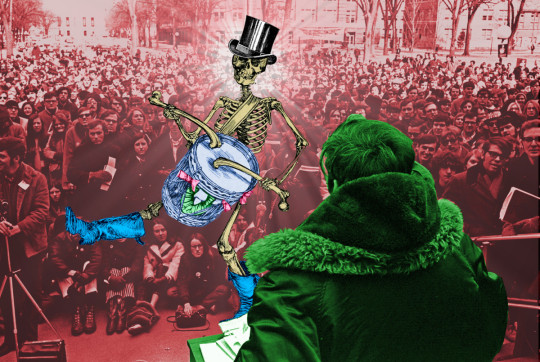
I'm on a 20+ city book tour for my new novel PICKS AND SHOVELS. Catch me in PITTSBURGH on May 15 at WHITE WHALE BOOKS, and in PDX on Jun 20 at BARNES AND NOBLE. More tour dates here.

It's hard to remember now, but for more than three years under Biden, it was possible to read the headlines every morning and feel excited that your government was taking big, decisive action to tame the corporate behemoths that rip you off, maim you on the job, and undermine our democracy.
The antitrust surge under Biden was and is a truly remarkable thing: a sustained, organized, effective government policy that supported the interests of the majority of people against the interests of a tiny cohort of ultra-wealthy wreckers and looters. According to political scientists, that antitrust surge should have been impossible. In 2014, a pair of political scientists from Northwestern and Princeton published their landmark study, "Testing Theories of American Politics: Elites, Interest Groups, and Average Citizens":
https://faculty.wcas.northwestern.edu/jnd260/cab/CAB2012%20-%20Page1.pdf
The paper analyzes 1,779 US policy fights from 1981 to 2002, and conclude that the US only does things that regular people want if those are also things that rich people want:
Ordinary citizens… get the policies they favor, but only because those policies happen also to be preferred by the economically-elite citizens who wield the actual influence.
When ordinary people want something that rich people don't want, ordinary people lose. Even when 80% of us want something, we only get our way 43% of the time. This is antidemocratic in the most fundamental sense: rich minorities get their way at the expense of working people, nearly all the time.
And then there's antitrust. Ordinary people don't like having their wages stolen. They don't like having their rents jacked up by algorithmic collusion. They don't like having their air and water poisoned. They don't like being mangled or killed on the job. They don't like having to sign noncompetes that bar them from taking a better job if one opens up.
More to the point, working people are not made better off when stuff like this happens. On average, working people own either zero or nearly zero stocks, not even in a 401(k) retirement savings, because 40 years of wage stagnation and the near-abolition of employer based defined-benefits pensions has left most Americans with nearly no retirement savings (hence the panic over Trump and Musk's attempt to kill Social Security):
https://pluralistic.net/2020/07/25/derechos-humanos/#are-there-no-poorhouses
By contrast, the richest 10% own 94% of all the stocks held by Americans. Even if you, personally, don't want to be locked up by a noncompete or have your water poisoned by frackers, if you're in the top 10%, you probably benefit when this happens. After all, businesses cheat and maim because it's profitable, not because they're sadistic (they may be sadistic, or they may be depraved in their indifference to the harms they visit upon the rest of us, but the reason they do it is money):
https://markets.businessinsider.com/news/stocks/stock-market-ownership-wealthiest-americans-one-percent-record-high-economy-2024-1
Antitrust systematically attacks the sky-high monopoly rents extracted by the largest corporations and redistributes them to working people and small businesses, which, for the most part, are not listed on stock exchanges or traded over the counter. In other words, antitrust is a way to clobber the policy priorities favored by the wealthy in order to benefit the rest of us.
That means that the antitrust surge is amazing. It's one of those things that shouldn't exist at all. It defies political science. What's more, antitrust fervor precedes the Biden administration. Some of the Biden administration's most important antitrust cases (like the Google case) started under Trump. Some were even kicked off by far-right state attorneys general, like Texas's cartoonishly corrupt AG Ken Paxton, who led a coalition of nearly every AG in American in suing Facebook.
Antitrust fervor isn't a US phenomenon – it's global. Take Canada: in its entire history, the Competition Bureau (Canada's answer to the FTC) filed only three merger challenges, and won zero of them. But last year, Parliament passed a massive, muscular new bill giving the Competition Bureau unprecedented powers:
https://www.parl.ca/legisinfo/en/bill/44-1/c-59
In the UK, the Competition and Markets Authority led the world in investigating and punishing Big Tech monopolies…and they did so under a succession of shambolic Conservative governments. Indeed, it was a Labour (or "Labour") Prime minister, Keir Starmer, who fired the head of the CMA and replaced him with the former head of Amazon UK:
https://pluralistic.net/2025/01/22/autocrats-of-trade/#dingo-babysitter
We've seen big, ambitious antitrust action all over the world: Germany, France, Spain, the EU, Australia, South Korea, Japan, and even China.
It goes without saying that there is no dark money org funneling billionaires' wealth into this project to destroy billionaires. This is a groundswell political phenomenon, it's global, and it's powerful. The fact that Starmer and Trump have gutted their wildly effective antitrust agencies is heartbreaking, but it's not the end. The reason the US and the UK pursued such an ambitious antitrust agenda is the public groundswell. Getting rid of the agencies doesn't kill that groundswell – if anything, it only makes people madder.
It's hard to overstate just how weird the antitrust surge is. We've been fighting for decades for even tiny concessions to the interests of working people – a modest, below-inflation rise in the minimum wage, say, or small-dollar efforts to improve public education, reduce student debt, or control the price of prescription drugs. These efforts have largely failed, and when they've succeeded, the victories were modest, or worse, merely symbolic.
But antitrust is the exception. Antitrust – again, a movement that is squarely aimed at neutralizing the power of the wealthy – is the most successful popular movement of the past decade. Companies worth trillions of dollars are facing breakup as a result of antitrust cases. Everyone from meat-packers to landlords to sea freighters to pharma companies have faced massive, multi-billion-dollar setbacks at the expense of the antitrust movement.
Like I said, the current antitrust surge kicked off under Trump. But of course, that doesn't mean the GOP power-brokers support it – rather, they were cornered into it by their own base. The same is true of the Democrats: Biden didn't appoint the most effective antitrust enforcers the US has seen since the 1970s because he opposed corporate monopolies. Remember, this is the guy who, on the campaign trail, told business audiences that "nothing would fundamentally change" under a Biden administration:
https://www.salon.com/2019/06/19/joe-biden-to-rich-donors-nothing-would-fundamentally-change-if-hes-elected/
Nor does the Democratic Party power-structure support this stuff. Remember when Harris's billionaire surrogates Marc Cuban and Reid Hoffman demanded that Harris fire the Biden administration's antitrust enforcers?
https://prospect.org/power/2024-07-26-corporate-wishcasting-attack-lina-khan/
The success of the antitrust movement happened in spite of the Democratic Party, in spite of the GOP. To the extent that either party embraced an antitrust agenda, it's because the people demanded it, so undeniably that the parties chose the public interest over the interest of the billionaires who call nearly every shot for them.
It's impossible to overstate what an anomaly this is. On today's episode of the excellent Organized Money podcast, hosts Matt Stoller and David Dayen reminisce with Jonathan Kanter, Biden's former DoJ antitrust boss, about a conference they attended together in 2017 where the after-dinner keynote speaker was Richard Posner, a judge who was hugely influential in the dismantling of antitrust in the 1970s and 1980s. According to Dayen, the substance of Posner's keynote was:
Antitrust. That's dead, isn't it? I don't know what you guys are even talking about. This is ridiculous. There is no such thing as antitrust law.
And Kanter, Dayen, Stoller and future FTC chair Lina Khan were all sitting around a table, listening to this in 2017. By 2021, Kanter and Khan were running the DoJ and FTC antitrust agenda, and they did more in the next three years than all their predecessors over the past 40 years, combined.
Khan, Kanter, and their colleagues (like Rohit Chopra at the CFPB) did incredible work during the Biden administration. There is no denying their skill, their competence, their commitment. But the reason they were able to bring all those virtues to bear in service to working Americans is the massive popular surge of rage at corporate dominance. In other words, the Biden administration's prodigious trustbusting accomplishments were the effect of the antitrust movement, not its cause.
The corollary is that just because Trump has dismantled the agencies that were buoyed up by the movement, it doesn't make the movement itself smaller or less powerful. If anything, the Trump regime's relentless pursuit of an agenda in service to the rich at working people's expense will only add fuel to the anti-corporate, anti-billionaire wildfire. Trump's tariff chaos might be bad for some parts of the ruling class, but as Van Jackson writes for Labor Notes, there's plenty of plutocrats who love the prospect of a deep recession sparked by global trade chaos:
[L]avish tax cuts, deregulation, and an environment friendly to union-busting are just as valuable to most CEOs as a growing economy. What they lose in the stock market, they will more than make up in surplus labor, a fire sale on distressed assets, and Trump’s promise to totally eliminate the capital gains tax.
https://labornotes.org/blogs/2025/04/viewpoint-why-oligarchs-want-recession?
American wealth is more concentrated today than it was in France on the eve of the French Revolution. People are pissed. That anger is out there, waiting to be harnessed by smart political movements:
https://twitter.com/highbrow_nobrow/status/1909607195961917687
To grab that anger and mobilize it, we need to show people that their rage over specific issues is actually downstream of excessive corporate power. Furious that one company owns every brand of eggs and has used the excuse of bird flu to make record profits? You're not angry about eggs, you're angry about corporate power:
https://pluralistic.net/2025/03/10/demand-and-supply/#keep-cal-maine-and-carry-on
Worried that the EPA has been put in an induced coma and that means your kids will grow up with asthma and lead poisoning? You're actually angry about corporate power:
https://www.theatlantic.com/health/archive/2025/04/air-pollution-trump-administration/682361/
The Department of Education is in the hands of a woman who took over her rapey husband's professional wrestling monopoly, a corporation that misclassified performers as contractors, leaving them without health care so they have to beg for pennies on Gofundme so they can die with dignity of their workplace-related injuries:
https://www.youtube.com/watch?v=m8UQ4O7UiDs
Trump's Secretary of Education is monumentally unqualified for her position. Not only is she is planning to fire teachers en masse and replace them with AI, she doesn't know what AI is and just gave a speech where she repeatedly referred to it as "A-1":
https://gizmodo.com/trumps-education-chief-linda-mcmahon-repeatedly-calls-ai-a1-in-school-speech-2000587329
Angry about this? Worried that your kids' teachers are about to be replaced with steak-sauce thanks to the incompetence of this fucking muttonhead? Me too. But you're not just angry at Trump or Linda McMahon – you're angry at corporate power.
In his book The Public Domain, the copyright scholar James Boyle talks about the political salience of the term "ecology." Boyle recounts how, prior to the rise of the word "ecology," there were many standalone issues, but no movement. Sure, you care about owls, and I care about the ozone layer, but what does the gaseous composition of the upper atmosphere have to do with the destiny of charismatic nocturnal avians?
https://thepublicdomain.org/thepublicdomain1.pdf
The term "ecology" welded all these thousands of issues together into a movement. When I look at the incredible, organic, bottom-up surge of antitrust energy, the only explanation I can find is that something similar is happening here. Concentrated corporate power is the common enemy of beer drinkers, surgeons, shippers, patients, farmers, grocery shoppers, social media users, any anyone who wears sneakers:
https://www.openmarketsinstitute.org/learn/monopoly-by-the-numbers
Something remarkable is happening, right under our noses. Nothing like this has happened in my lifetime. The world is terrifying, but this? This is exciting.
Smart political organizers have a once-in-a-century opportunity here. Trump's wildly unpopular destruction of the antitrust enforcement system opens up all kinds of opportunities for state enforcers (remember, states can also enforce antitrust law):
https://www.thesling.org/state-antimonopoly-enforcement-must-be-a-guardian-of-american-democracy-heres-how/
A massive political change that bubbles up from the bottom, aimed directly at the richest, most powerful people in the history of the human race, is an amazing thing. As bad as things are – and boy are they bad – this remains true, and important.

If you'd like an essay-formatted version of this post to read or share, here's a link to it on pluralistic.net, my surveillance-free, ad-free, tracker-free blog:
https://pluralistic.net/2025/04/10/solidarity-forever/#oligarchism

Image: umseas (modified) https://www.flickr.com/photos/snre/34605145761/
CC BY 2.0 https://creativecommons.org/licenses/by/2.0/deed.en
#pluralistic#ecology#james boyle#jamie boyle#antitrust#antimonopoly#pluralism#policy preferences#oligarchy#piketty#climate#epa#doge#linda mcmahon#wwe#nepobabies#anti-oligarchy
209 notes
·
View notes
Text
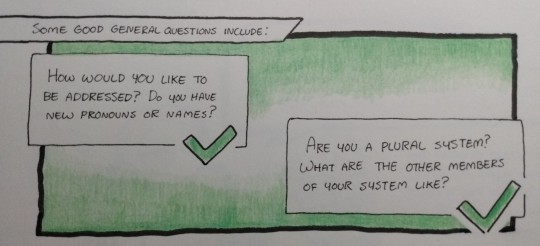
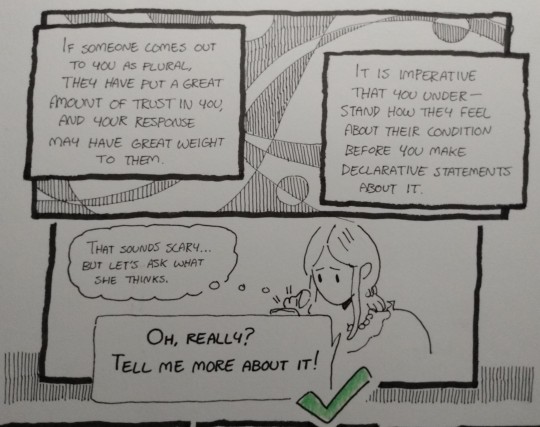
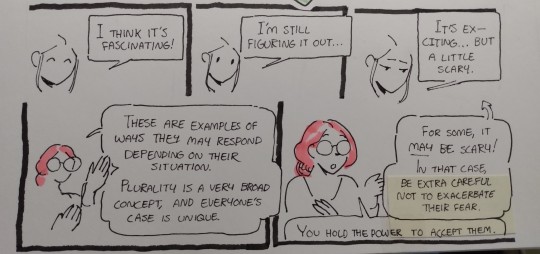

How to Talk to Plurals (1/2)
(description: Girl typing on phone: I'm plural! Mom replies: That's scary. Deirdre: Bzzt! Nope, wrong! Plurality is not scary.
Deirdre: If someone comes out to you as plural, they have put a great amount of trust in you, and your response may have great weight to them. It is imperative that you understand their condition before you make declarative statements about it.
Mom (thinking): That sounds scary... but let's ask what she thinks.
Mom (typing): Oh, really? Tell me more about it!
Girl: I think it's fascinating! / I'm still figuring it out... / It's exciting... but a little scary.
Deirdre: These are examples of ways they may respond depending on their situation. Plurality is a very broad concept, and everyone's case is unique.
Deirdre: For some, it may be scary! In that case, be extra careful not to exacerbate their fear. You hold the power to accept them.
Header: Some good general questions include... "How would you like to be addressed? Do you have new pronouns or names?" / "Are you a plural system? What are the other members of your system like?")
#comics#pen and paper#color#plurality#pluralism#plural system#multiplicity#headmates#alters#system education#comic#mental health comic
99 notes
·
View notes
Note
Monoconscious culture is being unable to tell if someone is co-fronting, co-conscious, or fully fronting alone because it always just feels like "me" but slightly different personality
.
#anonymous#monoconscious#monoconscious culture is#actually plural#plural community#plural system#pluralism#plurality
70 notes
·
View notes
Text
There was a time I would reject those who were not of my faith. But now, my heart has grown capable of taking on all forms. It is a pasture for gazelles, An abbey for monks. A table for the Torah, Kaaba for the pilgrim. My religion is love. Whichever the route love’s caravan shall take, That shall be the path of my faith.
Ibn Arabi
#ibn arabi#interfaith#pluralism#islam#it's possible this is a bad translation as so many#english translations of arab poets are -- if anyone knows please tell me!#this is the only i could find online#arab poets#poetry
19 notes
·
View notes
Text
LOL KEKW ENDOS

#actually plural#plural gang#pluralgang#pluralism#endo system#endos dni#not endo safe#endos fuck off#anti endo#pluralistic#plural system#plurality#plural community#plural culture is#plural#plural stuff#plural safe#did alter#did system#dissociative identity disorder#dissociative system#realsys#system pride#traumagenic system#system stuff#actually mentally ill#actually did#actuallyplural
79 notes
·
View notes
Text
As a switch, having a partner who experiences plurality is fucking amazing. Especially because of the two alters who front the most; one is very dominant and one is very submissive.
That means last week we had a whole night where I got to take someone apart piece by piece and hear whimpering and moaning and pleas.
Last night on the other hand... Let's just say the tables were rather turned.
#t4t#queer#lovers#queer nsft#t4t nsft#requited love#trans nsft#ftm nsft#transmasc#polyamory#plurality#pluralism
29 notes
·
View notes
Text
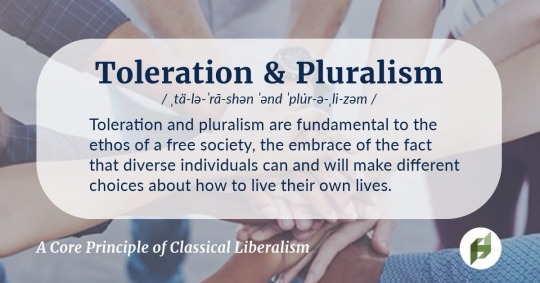
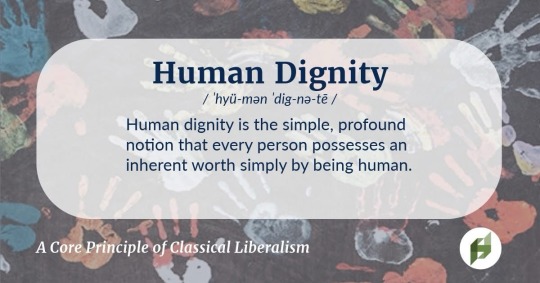
8 notes
·
View notes
Text
The wonderful thing about pluralism is that it allows you to see the truth that has been disputed, hidden, hated, and fought for so much of the history of Christianity.
Just as God loves and has a mighty use for all of his children, he similarly loves and has mighty uses for all of his Christians.
I was raised in the evangelical Baptist tradition, and there is truth in a church of equals where the gospel is discussed plainly. There is also beauty in Catholic and Orthodox art, and God can be a mighty muse. Every tradition of Christianity has its wonderful beauty.
Every faith has its divine-inspired beauty. I adore the sound of the Shofar and the Azzan, the serenity and peace of Buddhist temples, and the wonderful cornucopia of ways that people worship God in their own way, in whichever of God's faces they praise.
33 notes
·
View notes
Note
Plural joy is having a fictive of a problematic character from a problematic source, but they're just the sweetest little guy who loves to take care of his system and play harmless pranks on his friends.
Awh!!
#🗨️#🕶️ untagged#🦴 mirari#plural joy#plural positivity#plural love#endo safe#pro endo#endo friendly#endogenic safe#pro endogenic#endogenic friendly#plural system#plural posting#system positivity#sysblr#system stuff#pluralgang#pluralism
26 notes
·
View notes
Text

Ouroboros Der Siebente Ring Stefan George Illus. by Melchior Lechter Berlin: Blaetter für die Kunst, 1907.
* * * *
LETTERS FROM AN AMERICAN
December 7, 2024
Heather Cox Richardson
Dec 08, 2024
On Thursday, December 5, in Chicago, Illinois, former president Barack Obama gave the third in an annual series of lectures he has delivered since 2022 at his foundation’s Democracy Forum, which gathers experts, leaders, and young people to explore ways to safeguard democracy through community action.
Taken together, these lectures are a historical and philosophical exploration of the weaknesses of twenty-first century democracy as well as a road map of directions, some new and some old, for democracy’s defense. In 2022, Obama explored ways to counteract the flood of disinformation swamping a shared reality for decision making; in 2023 he discussed ways to address the extraordinary concentration of wealth that has undermined support for democracy globally.
On Thursday, Obama explored the concept of “pluralism,” a word he defined as meaning simply that “in a democracy, we all have to find a way to live alongside individuals and groups who are different than us.”
But rather than advocating what he called “holding hands and singing ‘Kumbaya’” as we all tolerate each other, Obama described modern pluralism as active work to form coalitions over shared issues. His argument echoed the concepts James Madison, a key framer of the Constitution, explained in Federalist #10 when he was trying to convince inhabitants of a big, diverse country that they should endorse the newly written document.
In 1787, many inhabitants of the fledgling nation objected to the idea of the strong national government proposed under the new constitution. They worried that such a government could fall under the control of a majority that would exercise its power to crush the rights of the minority. Madison agreed that such a calamity was likely in a small country, but argued that the very size and diversity of the people in the proposed United States would guard against such tyranny as people formed coalitions over one issue or another, then dissolved them and formed others. Such constantly shifting coalitions would serve the good of all Americans without forging a permanent powerful majority.
Obama called the Constitution “a rulebook for practicing pluralism.” The Bill of Rights gives us a series of rights that allow us to try to convince others to form coalitions to elect representatives who will “negotiate and compromise and hopefully advance our interests.”
Majority rule determines who wins, but the separation of powers and an independent judiciary are supposed to guarantee that the winners “don’t overreach to try to permanently entrench themselves or violate minority rights,” he said. The losers accept the outcome so long as they know they’ll have a chance to win the next time.
Obama noted that this system worked smoothly after World War II, largely because a booming economy meant rising standards of living that eased friction between different groups: management and labor, industry and agriculture. At the same time, the Cold War helped Americans come together against an external threat, and a limited range of popular culture reinforced a shared perspective on the world—everyone watched the sitcom Gilligan’s Island.
Most of all, though, Obama noted, American pluralism worked well because it largely excluded women and racial, gender, and religious minorities. He pointed out that as late as 2005, when he went to the Senate, he was the only African American there and only the third since Reconstruction. There were two Latinos and fourteen women.
In the 1960s, he noted drily, “things got more complicated.” “[H]istorically marginalized groups—Blacks, Latinos, Asians, Native Americans; women and gays and lesbians; and disabled Americans—demanded a seat at the table. Not only did they insist on a fair share of government-directed resources, but they brought with them new issues, born of their unique experiences that could not just be resolved by just giving them a bigger slice of the pie. So racial minorities insisted that the government intervene more deeply in the private sector and civil society to root out long-standing, systemic discrimination.”
Women wanted control over their own bodies, and gays and lesbians demanded equality before the law, challenging religious and social norms. “[P]olitics,” Obama said, “wasn’t just a fight about tax rates or roads anymore. It was about more fundamental issues that went to the core of our being and how we expected society to structure itself. Issues of identity and status and gender. Issues of family, values, and faith…. [A] lot of people…began to feel that their way of life, the American way of life, was under attack” just as increasing economic inequality made them think that other people were benefiting at their expense.
Increasingly, that economic inequality cloistered people in their own bubbles as unions, churches, and civic institutions decayed. “[W]ith the Cold War over, with generations scarred by Vietnam and Iraq and a media landscape that would shatter into a million disparate voices,” he said, Americans lost the sense of “a common national story or a common national purpose.” Media companies have played to extremes, and “[e]very election becomes an act of mortal combat.”
With that sense, there is “an increasing willingness on the part of politicians and their followers to violate democratic norms, to do anything they can to get their way, to use the power of the state to target critics and journalists and political rivals, and to even resort to violence in order to gain and hold on to power.”
For all that he was speaking in 2024, Obama could have been describing the realization of the fears of those opposed to the Constitution in 1787.
But he did not agree that those anti-Federalists had won the debate. Instead, he adapted Madison’s theory of pluralism to the modern era. Obama stood firm on the idea that the way to reclaim democracy is to build coalitions around taking action on issues that matter to the American people without regard to personal identities or political affiliations. Pluralism, Obama said, “is about recognizing that in a democracy, power comes from forging alliances, and building coalitions, and making room in those coalitions not only for the woke but also for the waking.”
And that, in many ways, identified the elephant—or rather the donkey—in the room. In the 2024 election, the Democratic Party under Vice President Kamala Harris and Minnesota governor Tim Walz very deliberately moved away from so-called identity politics: the idea that a person builds their political orientation around their pre-existing social identity. During the campaign, Harris rarely referred to the fact that if elected, she would be the first woman, as well as the first woman of color, to hold the presidency: when attendees at the Democratic National Convention wore white in honor of the suffragists, Harris wore black.
Instead, Harris and Walz embraced investing in the middle class and supporting small businesses. But that shift to the center did not translate into a presidential victory in 2024, and those on the political left, as well as progressive Democrats, are not convinced it was a good move.
Since the rise of Donald Trump, the MAGA party has been the one championing identity politics, rejecting American pluralism in favor of centering whiteness, a certain kind of individualist masculinity, Christianity, and misogyny. Making common cause with Republicans, even non-MAGA Republicans, in the face of such politics seems to the left and progressive Democrats self-defeating.
Obama disagrees. “[I]t’s understandable that people who have been oppressed or marginalized want to tell their stories and give voice fully to their experiences—to not have to hold back and censor themselves, especially because so many of them have been silenced in the past,” he said, “But too often, focusing on our differences leads to this notion of fixed victims and fixed villains.”
He stood firm against compromising core principles but said: “In order to build lasting majorities that support justice—not just for feeling good, not just for getting along, to deliver the goods—we have to be open to framing our issues, our causes, what we believe in in terms of ‘we’ and not just ‘us’ and ‘them.’”
And he emphasized that such cooperation works best when it’s about action, rather than just words, because action requires that people invest themselves in a common project. “It won't eradicate people's prejudices, but it will remind people that they don't have to agree on everything to at least agree on some things. And that there are some things we cannot do alone.” “It’s about agency and relationships.”
Then Obama addressed the political crisis of this moment, the one the anti-Federalists feared: “What happens when the other side has repeatedly and abundantly made clear they’re not interested in playing by the rules?” When that happens, he said, “pluralism does not call for us” to accept it. “[W]e have to stand firm and speak out and organize and mobilize as forcefully as we can.” Even then, though, “it’s important to look for allies in unlikely places,” he said, noting that “people on the other side…may share our beliefs in sticking to the rules, observing norms,” and that supporting them might help them “to exert influence on people they’ve got relationships with within the other party.”
The power of pluralism, he said, is that it can make people recognize their common experiences and common values. That, he said, is how we break the cycle of cynicism in our politics.
Obama’s argument has already drawn criticism. At MSNBC, Ben Burgis condemned Obama’s “centrist liberalism” as inadequate to address the real problems of inequality and warned that his political approach is outdated.
But it is striking how much Obama’s embrace of pluralism echoes that of James Madison, who had in his lifetime witnessed a group of wildly diverse colonists talk, write letters, argue, and organize to forge themselves into a movement that could throw off the age-old system of monarchy in favor of creating something altogether new.
LETTERS FROM AN AMERICAN
HEATHER COX RICHARDSON
#Heather Cox Richardson#Letters From An American#Barack Obama#both sides#Pluralism#Bill of Rights#centrist liberalism#allies#economic inequality
8 notes
·
View notes
Text

587 notes
·
View notes
Text
Theories on the Philosophy of Power
The philosophy of power encompasses various theories that seek to understand the nature, sources, and implications of power in human societies. Here are some key theories in the philosophy of power:
Pluralist Theory: Pluralist theory posits that power is dispersed among multiple groups and individuals in society, and no single entity holds absolute power. According to this view, power is decentralized, and different groups compete for influence through political, economic, and social channels.
Elite Theory: Elite theory contends that power is concentrated in the hands of a small elite group within society, such as political leaders, business magnates, or cultural elites. According to this perspective, elites wield disproportionate influence over political decisions and societal outcomes, often at the expense of the broader population.
Marxist Theory: Marxist theory emphasizes the role of economic power in shaping society and maintains that power relations are fundamentally determined by class dynamics. According to Marxists, the bourgeoisie (owners of capital) hold power over the proletariat (working class) through the control of economic resources, leading to exploitation and inequality.
Foucauldian Theory: Drawing from the work of Michel Foucault, Foucauldian theory examines power as a diffuse and pervasive force that operates through disciplinary mechanisms and social institutions. Power is not solely held by individuals or groups but is embedded in societal structures and practices, shaping norms, behaviors, and subjectivities.
Feminist Theory: Feminist theories of power highlight the gendered dimensions of power relations and critique patriarchal structures that perpetuate male dominance and female subordination. Feminist scholars analyze how power operates within families, workplaces, and political systems, and advocate for gender equality and social justice.
Poststructuralist Theory: Poststructuralist theorists, such as Jacques Derrida and Judith Butler, challenge essentialist notions of power and instead focus on power as performative and discursive. Power is understood as fluid and contingent, constructed through language, discourse, and social practices, rather than being inherent or fixed.
Network Theory: Network theory conceptualizes power as emerging from relational connections and interactions between actors within complex networks. Power is distributed unevenly across network structures, with some nodes or actors exerting greater influence due to their centrality, connectivity, or resource control.
Rational Choice Theory: Rational choice theory models individual behavior as driven by rational calculations of costs and benefits, including the pursuit of power. According to this approach, individuals seek to maximize their utility or achieve their goals by strategically deploying resources and forming alliances to enhance their power position.
Critical Theory: Critical theories of power, influenced by the Frankfurt School and critical social theory, emphasize the role of ideology, culture, and social institutions in perpetuating power inequalities. Critical theorists analyze how power operates through processes of domination, hegemony, and ideological control, and advocate for emancipatory social change.
Intersectional Theory: Intersectional theory considers how power operates at the intersections of multiple axes of identity, including race, gender, class, sexuality, and ability. This approach recognizes that power relations are shaped by intersecting systems of oppression and privilege, and emphasizes the importance of addressing multiple forms of inequality simultaneously.
These theories offer diverse perspectives on the nature and dynamics of power, illuminating its complexities and providing insights into its effects on individuals, groups, and societies.
#philosophy#epistemology#knowledge#learning#chatgpt#education#metaphysics#ethics#psychology#Pluralism#Elite theory#Marxism#Foucault#Feminism#Poststructuralism#Network theory#Rational choice theory#Critical theory#Intersectionality#power#culture#society#sociology#theory
34 notes
·
View notes